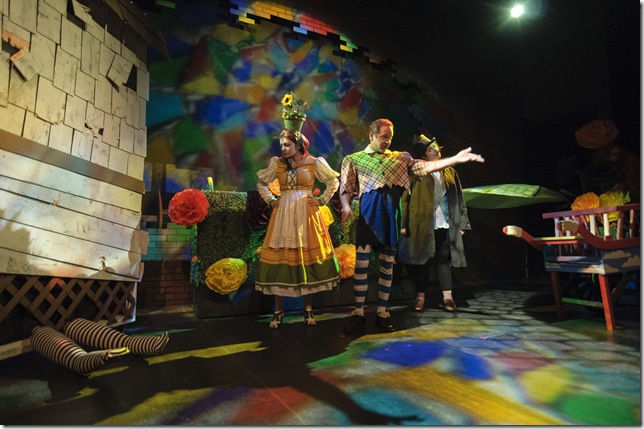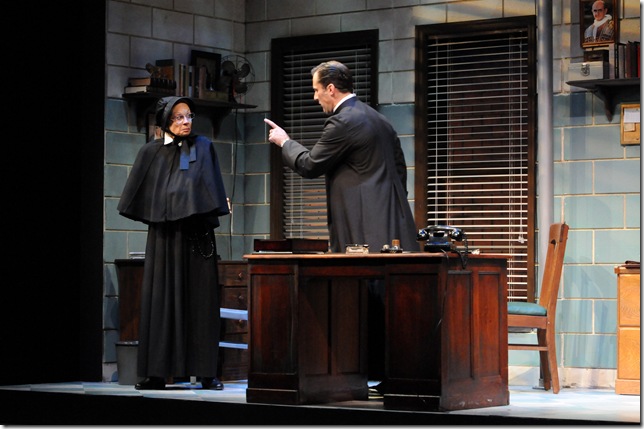South Florida playwright Michael McKeever has cranked out so many well-crafted full-length stage scripts over the past two decades that it is easy to overlook that he has also quietly mastered the short play format.
That should be harder to ignore now that he has compiled seven of his brief sketches into an evening he calls The Whole Caboodle. First performed from 1998 to 2011 in City Theatre’s Summer Shorts and Naked Stage’s 24 Hour Theatre Project, these little gems showcase McKeever’s skill with character, comedy and brevity.
And to rub our noses in the fact that he is inordinately talented, McKeever also appears in several of the production’s plays.
Most of the pieces showcase his sense of whimsy, particularly in response to famous works of art. Typical is the curtain-raiser, based on Grant Wood’s iconic painting American Gothic of a deadpan farm couple. In the scene, the woman (the estimable Elena Maria Garcia) walks out of the canvas, bored with her stationery pose, more interested in seeing the world. With Midwest pragmatism, the man in the portrait (McKeever) tries to persuade her to stay.
In a similar vein, Garcia deftly chews the scenery as the mid-19th century’s reigning American theatrical diva in Laura Keene Goes On. McKeever takes us backstage at Ford’s Theatre, where Keene (Garcia again) is about to go on in her 1,000th performance of Our American Cousin. Yes, it is the night that President Lincoln is shot, which Keene takes as a personal affront, since the audience will now be distracted from her star power. Details keeps coming of the tragedy in the auditorium, but self-absorbed Laura remains oblivious to any woes other than her own.
Both plays are succinct and droll, made all the more so by the comic impulses ― physical, facial and verbal ― of Garcia, who somehow manages to serve the playwright and also overshadow him.
In a more serious vein is Move On, or Sondheim at Studio 54, about a married couple given tickets to the musical Sunday in the Park With George. The husband (Clay Cartland) dreads the prospect of sitting through such arty fare, but when the song Move On is performed, he is reduced to uncontrollable sobs. McKeever does not avoid the joke about show tunes and gays, but at its heart, this is a lovely piece about the transforming power of art.
The evening ends with the more broadly comic Splat!, which lampoons The Wizard of Oz with a group of practical-minded Munchkins ― led by a cynical McKeever ― trying to decide what to do with the Wicked Witch, now that that girl from Kansas has landed a house on top of her. Oh, my.
Parade Productions’ artistic director Kim St. Leon stages the collection with her own dollop of whimsy, with connecting scenes in the actors’ group dressing room as they prepare to go onstage. In all, The Whole Caboodle is the most satisfying production yet from this young company, which had the smarts to rely this season on McKeever.
THE WHOLE CABOODLE, Parade Productions at The Mizner Park Cultural Arts Center, 201 Plaza Real, Boca Raton. Through Sunday, Feb. 24. Tickets: $30. Call: (866) 811-4111.
* * *
Producing small-cast dramas is undoubtedly a way to save money for the Maltz Jupiter Theatre, but that does not mean that the company takes any less care with them than it does with its lavish musicals. A case in point is its current well-staged, acted and designed take on Doubt: A Parable, John Patrick Shanley’s Pulitzer Prize and Tony Award-winning look at the microcosmic world inside a Bronx parochial school in the turbulent early ’60s.
It was a time, soon after the assassination of John F. Kennedy, when the nation was beginning to split over the Vietnam War and the Catholic Church was dividing over efforts to move forward or to cling to the more rigid traditions of the past. A similar schism is being played out at St. Nicholas School, represented by its suspicious, conservative principal Sister Aloysius and affable, liberal priest Father Brendan Flynn.
Although Shanley wants us to consider the larger, fundamental changes that were occurring in society, at the center of Doubt is the question of whether Flynn acted inappropriately with 12-year-old altar boy Donald Muller, the only black student at the school. Sister Aloysius has no proof of the priest’s guilt, but that does not prevent her from having complete certainty and doing what she can to rid the school of the perceived predator.
Shanley nimbly manipulates the audience, whipsawing us back and forth between the two sides of the did-he-or-didn’t-he case.
Our sympathies depend on the persuasiveness of the two leading performers, modulated by the understated direction of Palm Beach Dramaworks’ J. Barry Lewis. Travelling up-county from Dramaworks’ recent acclaimed A Delicate Balance is the sublime Maureen Anderman, who radiates a stern certainty that borders on paranoia. To her, Father Flynn represents all that is going wrong in the world, based on his preference for long fingernails, secular Christmas songs and ball point pens.
Opposing her in this tug-of-war over his job and reputation is Jim Ballard, an ingratiating as Anderman is rigid. From his opening scenes ― a down-to-earth sermon on the subject of doubt and a big brotherly basketball coaching session ― we are already on Flynn’s side, at least for the moment.
Karen Stephens lends solid support as Donald’s mother, standing up to Sister Aloysius by minimizing the abuse charges, concerned only about getting her son into a good high school. Julie Kleiner is aptly impressionable as Sister James, a young nun who prefers to see the best in everyone.
Timothy R. Mackabee, resident designer at Williamstown Theatre Festival, solves the challenge of moving us inside and outside the school with an artful set of brick walls that changes locales with cinematic wipes and pans.
Just as you don’t have to be Jewish to like Levy’s Rye Bread, as the ads used to assure us, you do not need to be Catholic to become embroiled in Doubt: A Parable. And when it is served up in such a taut, tight production as at the Maltz, it can be recommended with certainty.
DOUBT: A PARABLE, Maltz Jupiter Theatre, 1001 E. Indiantown Road, Jupiter. Through Sunday. Tickets: Starting at $46. Call: (561) 575-2223.

